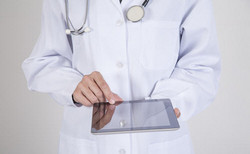e-health app guidelines developed to improve elderly care
Growing demand for elderly e-health applications – the delivery of healthcare and services by electronic means – and m-health applications – the delivery of healthcare services via mobile communication devices such as Smartphones – has created an opportunity for SMEs to develop innovative internet, mobile phones and tablets-based solutions along with video games that can improve the health of older people. The EU-funded IROHLA project trialled several of these promising technologies with elderly participants – including those with low health literacy – in order to assuage market feasibility and to create a set of development guidelines. One of the main conclusions was the need for active and continuous collaboration between application developers, healthcare professionals and researchers. Other matters that should be taken into consideration when designing elderly health apps include simplification of content and use and the ability to set short-term, personalised goals. One pilot project for example sought to improve participants’ knowledge about physical activity and healthy nutrition. The app enables participants to set their own dietary and physical activity goals and assess them at the end of a specific period. The system then generated personalised messages. Just as importantly, the project team reported that while senior citizens reacted positively towards e-health and m-health applications, studies found that socio-economic status plays an important role in determining the depth of understanding of new technology. This factor should not be ignored when designing e-health and m-health applications, in order to ensure that e-health tools are of benefit to all, irrespective of socio-economic group, says the project team. Indeed, in the EU, health literacy – the level at which people can access, understand and communicate information in order have good health – is an area in need of improvement. This is evident from a recent survey that showed that between 30 and 50 % of the population is limited in this area, with the elderly particularly vulnerable. The guidelines developed by the IROHLA project will help Europe’s healthcare sector to tap the potential of e-health and m-health innovations, in order to boost health literacy among senior citizens, provide immediate contact with care givers and enhance informed decision making. It is also hoped that IT health innovations will facilitate more targeted public health and medical interventions, as well as remote diagnosis and monitoring. Indeed, the team is confident that the project, which was completed at the end of November 2015, will contribute towards improving health literacy among the elderly and boost e-health services in Europe. ‘What I hope is that older adults with low health literacy in Europe feel like they are in charge of their own health,’ says project team member Professor Louise Meijering, from the University of Groningen, the Netherlands. ‘They should be able to see the skilled professionals they need to, and be able to ask questions. The end result would be that older adults make informed choices about their health.’ For further information please visit: IROHLA project website
Countries
Netherlands



